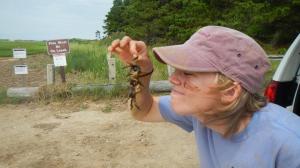This is my submission for the 2007 Letters About Literature competition. This was actually an english assignment, but I ended up winning the level 2 (for middle schoolers) national competition! My parents and I went to Washington, D.C. where I read my submission at the National Book Festival and got to tour the museums, memorials, and even the White House (I met Nancy Pelosi, which was pretty cool)! Now, I’m planning on writing a book about my experiences as an adopted child.
Dear Author Unknown,
When young children first begin to understand the concepts of life, they start asking questions. One of the typical questions of a child whose mother is pregnant would be: “Did I come from your stomach mom?” Usually, the answer would be “yes”, but for my mom, it was always simply “no.” Being such a young girl, however, I never understood that this didn’t make sense until it dawned on me: all children have to be born. So this time I asked my mom why I wasn’t born from her. What my mom did in response to that was to read me your poem, Legacy of an Adopted Child. At that time in my life, your poem didn’t have too much meaning to me, and I went on asking my mom to elaborate on adoption and its meaning. But as I grew older, I began to connect more and more to the person your poem addresses.
At about the time the harsh realities of life were becoming clear to me, I started to mourn for what I was missing out on: not truly being a blood relative of my adoptive family. Unfortunately, my parents weren’t able to conceive children of their own, and decided not to adopt any more kids. Therefore, I was alone in this situation, not really having any strong friendships with other adopted children in my community. I began to feel gaps between my friends when they talked about their nationalities and family traditions. Being blonde and light-skinned, I felt a little sad that I didn’t look like my mostly Italian family. When a teen’s raging hormones kicked in, my emotions doubled in size. Because my birth mother became pregnant with me when she was still in high school and not married, I had feelings of anger for her mistakes, and I was worried that I could make the same mistake as she did. It was hard to be myself when that person was labeled ‘adopted’, so I tried to be ‘normal’ instead.
It was just another average day of my life when I walked through the hallway in my house, and my eye caught the word “adopted” on a piece of paper, framed and hanging on the wall. I had always remembered it being there, but never looked at it in detail. As I stepped closer, I saw that the title was Legacy of an Adopted Child. The faint memory of my mother showing me and reading it to me as a young girl flooded back to me. To refresh my memory, I read through the verses. Reading your poem that day made something inside me feel different. It was like turning on a light after a long time-everything was brighter and easier to see. My eyes were opened to a very different point of view that I had never seen before. What I saw was that maybe the way you conveyed an image of the birth mother was really how she felt, too. Possibly, instead of throwing me away like an empty cardboard box, it was actually difficult for my own birth mother to choose a family for me and let me go. Upon finishing the poem, I was crying tears reflecting strong feelings of connection, sadness, and even joy.
Before reading Legacy of an Adopted Child, I was insecure and uncomfortable with my position of being adopted. I felt like I was being labeled and wasn’t able to really be myself. I used to believe my birth mother was someone who didn’t care about me and cast me away. Now, I know that I was wrong. In reality, she displayed a great deal of love and courage when she made that decision. She knew that it was best for me to grow up with a couple who had the capability to provide me more opportunities than she could have under the circumstances. Also, it may be true that I am labeled as ‘adopted’, but that doesn’t mean anything. Everyone is different, and being ‘normal’ means being you.
In the last stanza of your poem, you write: “And now you ask me through your tears, the age-old question through the years… Heredity or environment, which am I the product of? Neither, my darling-neither…Just two different kinds of love.” This question is the same one I had asked myself so many times. Answering it for me has inspired me to accept and be proud of being adopted. Now, I look at the world through the eyes of someone much wiser, stronger, and more self-confident than ever before, and I thank you for allowing me these virtues.
Sincerely,
Elena Suglia, Grade 8


